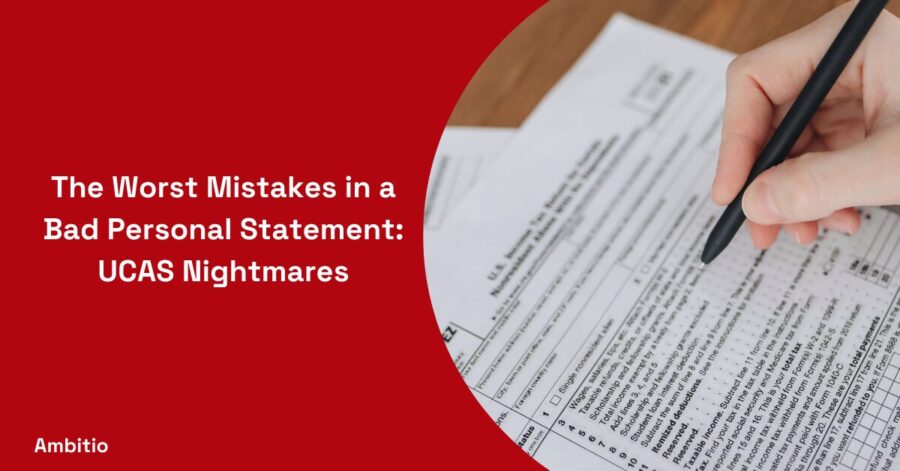14 December 2024
8 minutes read
The Worst Mistakes in a Bad Personal Statement: UCAS Nightmares

Introduction
When it comes to applying for university through UCAS, your personal statement is your chance to shine. It’s the one document that allows you to speak directly to admissions officers and convince them that you’re the ideal candidate for their institution.
However, not all personal statements are created equal, and some can be downright dreadful. In this comprehensive guide, we’ll explore the world of bad personal statements, the common mistakes students make, and how to avoid them. By the end, you’ll be equipped with the knowledge and strategies to craft a stellar personal statement that stands out in the competitive world of university applications.
The Anatomy of a Bad Personal Statement
1. Clichés Galore
A bad personal statement often reads like a collection of tired, overused phrases. Phrases like “ever since I was a child,” “passionate about helping people,” or “changing the world” may have been powerful once, but they now make admissions officers groan. These clichés show a lack of originality and genuine thought.
The Impact of Clichés on Your Personal Statement
Clichés are the enemy of a compelling personal statement. They not only make your writing seem unoriginal but also fail to convey your true personality and passion for the subject. Admissions officers read thousands of statements, and clichés can quickly blend your application into the background.
Clichés like “I’ve always wanted to help people” or “I’m a hard worker” are vague and unconvincing. Instead of telling, show through specific examples and experiences. For instance, if you’re interested in medicine because of a personal experience, share that story.
To avoid clichés, take time to brainstorm unique aspects of your journey and perspective. What sets you apart from other applicants? What experiences have shaped your aspirations? Craft your personal statement around these distinctive elements to create a memorable impression.
2. Lack of Focus
Your personal statement should demonstrate your enthusiasm for the specific course and university you’re applying to. A bad statement is too generic, failing to address why you’re drawn to that particular subject or institution. It’s crucial to tailor your statement to each application.
The Importance of Course and University Alignment
One of the most common mistakes students make is creating a one-size-fits-all personal statement. While it’s time-consuming, tailoring your statement to each course and university you apply to is essential.
Admissions officers want to see that you’ve done your research and have a genuine interest in their program. They want to know why you’re a good fit for their institution specifically. Generic statements that could be sent to any university don’t demonstrate this commitment.
To avoid this mistake, start by researching each university and course thoroughly. Understand their unique offerings, faculty, and the aspects that make them stand out. Then, incorporate this knowledge into your personal statement. Explain why you want to study there, how their program aligns with your goals, and what you can contribute to their community.
3. Grammatical Errors
Poor grammar and spelling mistakes are inexcusable in a personal statement. These errors can make you appear careless and unprofessional. Always proofread your statement carefully and ask others for feedback.
The Implications of Grammatical Errors
Grammatical errors in your personal statement can send a strong signal to admissions officers that you lack attention to detail and professionalism. In a competitive application process, this is a red flag you want to avoid at all costs.
Before submitting your personal statement, proofread it multiple times. Pay attention to common issues such as subject-verb agreement, sentence structure, and punctuation. Consider using grammar-checking software or seeking help from teachers or writing tutors to ensure your statement is error-free.
It’s also essential to avoid overly complex sentence structures and jargon that may confuse the reader. Clear and concise writing is not only easier to read but also demonstrates effective communication skills, a quality universities highly value.
4. Arrogance
Confidence is essential, but arrogance is off-putting. Avoid coming across as self-absorbed or overly confident. Instead, strike a balance between highlighting your achievements and demonstrating humility and a willingness to learn.
Striking the Right Tone in Your Personal Statement
Balancing confidence and humility in your personal statement can be challenging but is crucial for making a positive impression. Arrogance can turn admissions officers away, while self-doubt may not showcase your strengths effectively.
To strike the right tone, focus on showcasing your achievements and qualities without overhyping them. Use specific examples and experiences to highlight your capabilities. Discuss challenges you’ve faced and what you’ve learned from them, demonstrating resilience and growth.
Additionally, it’s essential to show a genuine interest in learning and personal development. Admissions officers appreciate candidates who acknowledge their room for improvement and their eagerness to embrace new challenges.
5. Lack of Authenticity
Copying someone else’s personal statement or using a writing service is a surefire way to end up with a bad statement. Admissions officers are skilled at spotting authenticity, and a lack of it will set off alarm bells.
The Perils of Plagiarism and Lack of Authenticity
Plagiarism and lack of authenticity are cardinal sins in the world of personal statements. Admissions officers have extensive experience in reviewing statements, and they can quickly identify inconsistencies or borrowed content.
Copying someone else’s work not only violates academic integrity but also fails to showcase your unique qualities and experiences. Authenticity is what makes your personal statement compelling and memorable. It allows admissions officers to understand who you are and what you bring to the table.
To ensure authenticity, write your personal statement from scratch, using your own words and experiences. Seek inspiration and guidance from reputable sources and mentors, but always put your unique spin on your narrative. Be honest about your achievements, aspirations, and challenges, as authenticity will resonate more with admissions officers than a manufactured image.
6. Ignoring the Basics
Some students forget the fundamentals of writing an essay. This includes clear structure, proper organization, and a compelling introduction. Starting with a quote or telling a story can capture the reader’s attention and set a positive tone.
The Importance of Essay Structure and Engaging Openings
An effectively structured personal statement not only helps the reader follow your narrative but also demonstrates your ability to organize your thoughts coherently. Ignoring the basics of essay structure can make your statement challenging to read and understand.
Start your personal statement with an engaging hook. This could be a compelling quote, a personal anecdote, or a thought-provoking question. An attention-grabbing opening sets a positive tone and encourages the reader to continue.
Follow a logical flow throughout your statement. Organize your content into paragraphs with clear transitions. Each paragraph should focus on a specific aspect of your life, experiences, or aspirations, ensuring that your narrative unfolds naturally.
Additionally, be concise and to the point. Admissions officers read numerous statements, so keeping your writing clear and straightforward will make a positive impression. Avoid using overly complex language or jargon, as it can obscure your message.
Crafting a Standout Personal Statement
To ensure your personal statement doesn’t fall into the bad category, here are some tips:
1. Start Early
Writing a great personal statement takes time. Begin early to allow yourself ample opportunity for revisions and improvements.
The Benefits of Early Start in Personal Statement Writing
Starting your personal statement early provides several advantages. First, it allows you to brainstorm and explore various ideas, helping you find the most compelling aspects of your journey to highlight. Early drafting also gives you the freedom to experiment with different writing styles and structures.
Furthermore, starting early ensures that you have sufficient time for the critical revision process. You can seek feedback from teachers, mentors, or peers and make iterative improvements to your statement. This refining phase is crucial for crafting a polished and persuasive final product.
Another benefit of an early start is reduced stress. Rushing through your personal statement close to the application deadline can lead to anxiety and may result in subpar writing. By starting early, you can maintain a steady pace and approach the task with confidence.
2. Be Specific
Use specific examples to illustrate your points. Whether it’s a project you led, an obstacle you overcame, or an experience that shaped you, provide details that paint a vivid picture.
The Power of Specific Examples in Personal Statements
Specific examples are the backbone of a compelling personal statement. They add depth and authenticity to your narrative, making your experiences and achievements come alive for the reader.
When discussing your accomplishments or personal growth, avoid vague statements like “I’m a hard worker” or “I’m passionate about science.” Instead, dive into specific instances where you demonstrated these qualities. Describe the challenging research project you undertook or the volunteer work that ignited your passion for a cause.
By delving into the specifics of your experiences, you not only engage the reader but also provide evidence of your abilities. Admissions officers appreciate candidates who can back up their claims with concrete examples.
3. Show Self-Reflection
Discuss how your experiences have influenced your personal and academic growth. Admissions officers want to see that you’ve thought deeply about your path.
The Significance of Self-Reflection in Your Personal Statement
Self-reflection is a critical component of a successful personal statement. It allows you to connect your experiences and aspirations, showcasing how your journey has shaped your academic and personal growth.
Admissions officers are not just interested in what you’ve done but also in your ability to learn and adapt. Self-reflection demonstrates your capacity for introspection and your willingness to learn from your experiences, both of which are valuable qualities in a university student.
When discussing your experiences, go beyond the surface level. Share insights you’ve gained, challenges you’ve overcome, and how these moments have influenced your decision to pursue a particular course or attend a specific university.
4. Tailor Your Statement
Customize your personal statement for each university and course. Explain why you want to study there, what you can bring to the community, and how their program aligns with your goals.
The Art of Tailoring Your Personal Statement
Tailoring your personal statement for each university and course is a time-consuming but highly effective strategy. It shows admissions officers that you’ve invested effort into understanding their institution and that you’re genuinely interested in becoming a part of their community.
Begin by researching each university’s programs, faculty, and values. Identify specific aspects that align with your interests and goals. Highlight these in your personal statement, explaining why you’re drawn to their offerings.
Furthermore, emphasize how you can contribute to the university community. Discuss your skills, experiences, and interests that make you a valuable addition to their student body. Show that you’ve thought about your role within the university beyond academics.
5. Seek Feedback
Don’t hesitate to ask teachers, advisors, or experienced professionals for feedback. Their insights can be invaluable.
The Benefits of Seeking Feedback on Your Personal Statement
Feedback is a crucial part of the personal statement writing process. It provides you with different perspectives and helps you identify areas for improvement that you might have missed.
Start by sharing your draft with teachers or advisors who are familiar with the university application process. They can offer guidance on structure, content, and overall effectiveness. It’s also beneficial to seek feedback from peers or family members who can provide insights from a reader’s perspective.
Remember that feedback is not just about correcting errors but also about refining your narrative and message. Be open to constructive criticism and use it to enhance the quality of your personal statement.
Conclusion
In conclusion, your personal statement is a powerful tool that can make or break your university application. Avoiding common personal statement mistakes is essential for crafting a compelling narrative that captivates admissions officers.
By following the tips and strategies outlined in this guide, you can create a personal statement that allows admissions officers to see the world through your eyes and understand why you’re the perfect fit for their university.
So, take a deep breath, put pen to paper (or fingers to keyboard), and let your personality shine through in your UCAS personal statement. With dedication, authenticity, and careful planning, you can create a personal statement that not only avoids the pitfalls of bad statements but also elevates your application to new heights. Good luck!
FAQs
What is a personal statement, and why is it important for UCAS applications?
A personal statement is a crucial part of your UCAS application, where you showcase your personality, achievements, and aspirations. It helps universities understand who you are beyond your grades.
What are some common mistakes in personal statements?
Common mistakes include clichés, poor grammar, arrogance, copying others, and lack of focus on the course or university.
Can you share some examples of bad personal statements?
While we won’t share specific examples, we’ll discuss common mistakes that make personal statements ineffective.
How can I avoid making a bad personal statement?
To avoid a bad personal statement, focus on your genuine passion for the course, provide specific examples of your achievements and experiences, and seek feedback from teachers or professionals.
What should a good personal statement include?
A good personal statement should include your motivation for the course, relevant experiences, skills, and how you can contribute to the university community.
Is it okay to use a personal statement writing service?
It’s not recommended to use writing services as they may lead to plagiarism and lack of authenticity in your statement. It’s best to write it yourself with guidance from teachers or advisors.
How long should a personal statement be?
UCAS allows up to 4,000 characters or 47 lines for a personal statement, so make the most of it without exceeding the limit.
What role do extracurricular activities play in a personal statement?
Extracurricular activities can demonstrate your skills, commitment, and passion outside of academics, making your statement more well-rounded.
What are some tips for writing a great personal statement?
Focus on a compelling opening, use specific examples, show self-reflection, tailor it to the course/university, and proofread carefully.
How can I schedule a free consultation for personal statement guidance?
You can reach out to your school’s career counselor or teacher for assistance, or explore online resources and forums for advice and feedback.

You can study at top universities worldwide!
Get expert tips and tricks to get into top universities with a free expert session.
Book Your Free 30-Minute Session Now! Book a call now




























